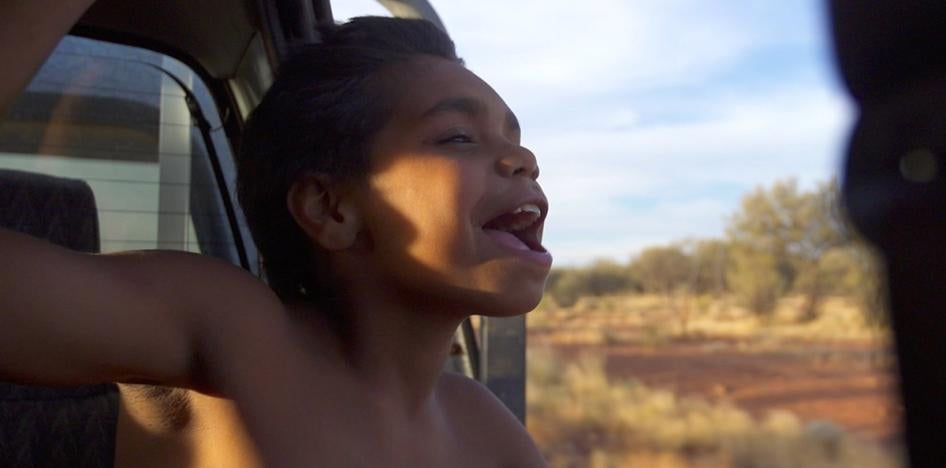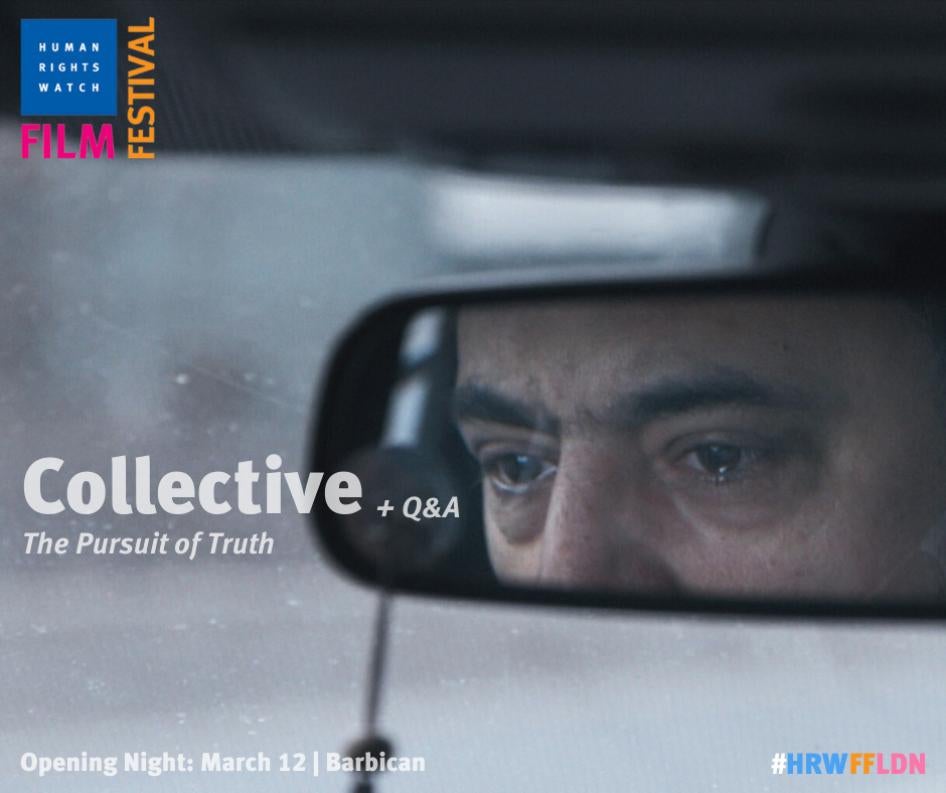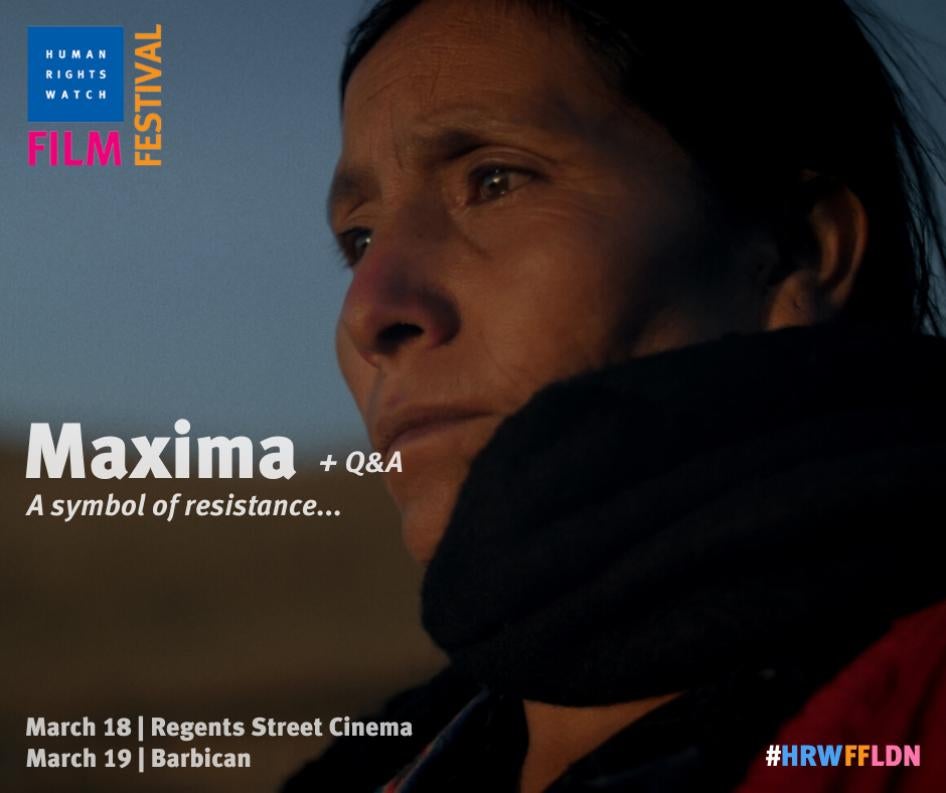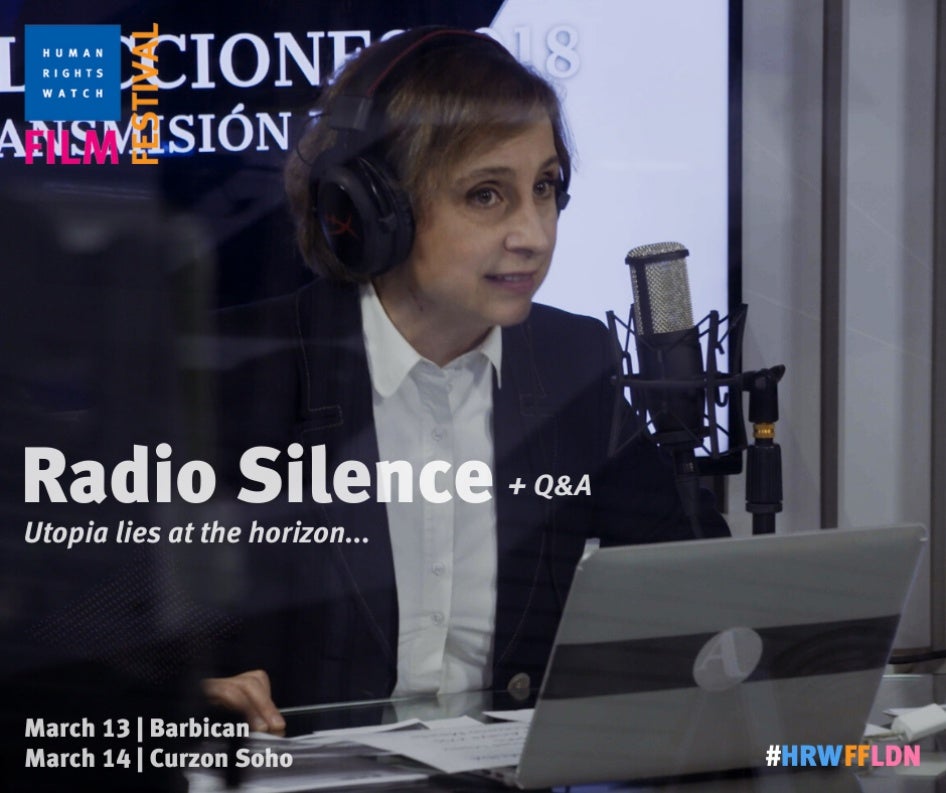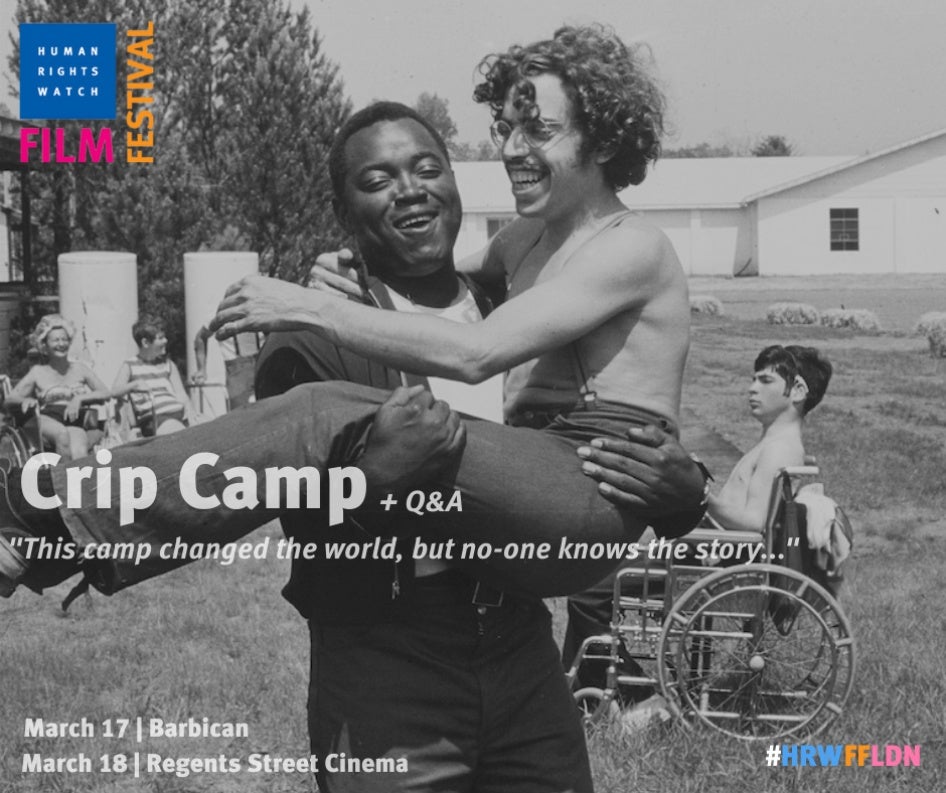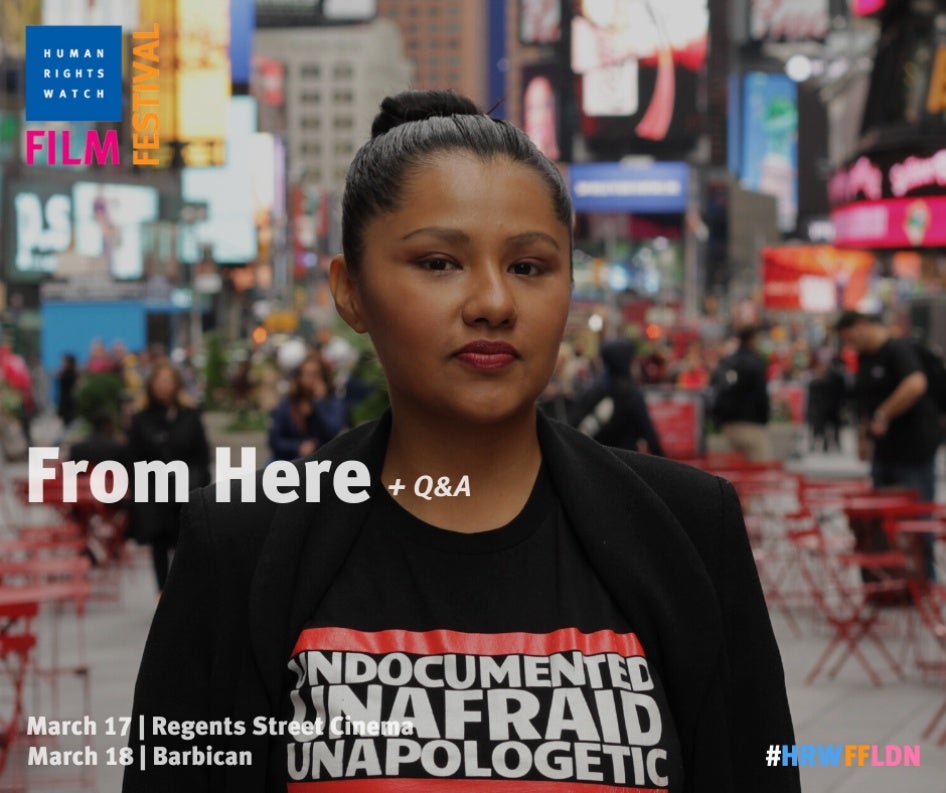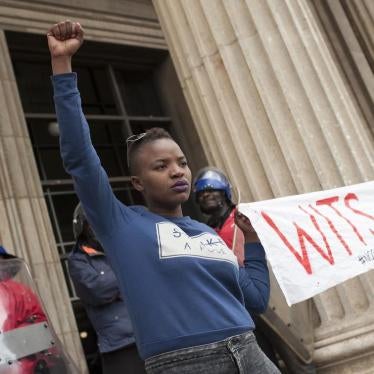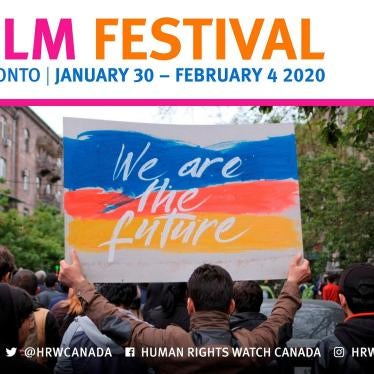The London Human Rights Watch Film Festival (HRWFF) will be presented from 12 to 20 March 2020, featuring empowering documentaries and dramas celebrating courageous people from 14 countries: Armenia, Australia, Bangladesh, Bolivia, China, Guatemala, Germany, Iran, Macedonia, Mexico, Peru, Romania, the United States, and Vietnam. Eleven of the 14 films selected for this 24th edition are directed by women.
Many filmmakers, contributors, Human Rights Watch researchers, and activists will take part in rigorous post-screening Q&As and panel discussions at Barbican Cinema, Curzon Soho, and Regent Street Cinema. As detailed below and on the festival website, a number of access and school screenings will take place throughout the festival.
The festival, generously supported by players of People’s Postcode Lottery, will open at the Barbican Cinema 1 on Thursday, 12 March with Alexander Nanau’s (“Toto and His Sisters”) powerful “Collective.” Following the fatal 2015 nightclub fire in Bucharest which killed 27 young people, injured another 180, and subsequently led to the death of a further 37 from bacterial infections, a group of dedicated journalists from the Romanian newspaper Gazeta Sporturilor uncover a vast healthcare fraud. Their relentless and detailed investigation revealed that urgent hospital funding had been siphoned off and disinfectants diluted, enriching the country’s most powerful moguls, hospital managers, doctors, and politicians. As the tide begins to turn with increased public awareness, “Collective” highlights the essential role of a free press in calling out corruption. The screening will be followed by an in-depth discussion with the director, Alexander Nanau, and special guests.
“Our Opening Night film for London 2020 encapsulates the core work of Human Rights Watch: investigate, expose, change,” said John Biaggi, director of the HRWFF. “Journalism has been under increasing assault these past few years and Alexander Nanau’s documentary highlights the resilience and challenges of good journalism in advancing human rights. I am delighted we’re opening the festival with this searing work of universal importance.”
Rubaiyat Hossain’s impressive debut drama, “Made in Bangladesh,” will close the festival on Friday, 20 March. Channeling real-life stories that the Bangladeshi filmmaker encountered as a women's rights activist, this layered film shines a light on the oppressive clothing industry. It shows how Shimu, a tenacious factory worker, battles to create a union in the factory where she works, in the face of patriarchal bosses, violent disapproval from her husband, and indifferent government officials. The screening will be followed by an in-depth discussion with Rubaiyat Hossain and special guests.
“One hundred years ago in Bangladesh, women had to live in seclusion. Today, they are working, they are making a living for themselves and their families, and they are fighting within the factory and at home for their rights” said Rubaiyat Hossain, the director of “Made in Bangladesh.”
Inspiring insights into predominantly female activist leaders, indigenous rights, mass collective movements, the ongoing struggle for disability rights, and the power of journalism will be seen throughout the festival.
Two beautiful documentaries, from Peru and Australia, shine a light on courageous individuals – one elder and one youth – both fighting for indigenous rights.
Claudia Sparrow’s “Maxima” tells the story of Máxima Acuña (winner of the 2016 environmental Goldman Prize) who owns a small, remote plot in the Peruvian highlands which sits directly in the path of a multi-billion dollar project run by one of the world’s largest gold mining corporations. Faced with intimidation, violence, and criminal prosecution, Acuña tirelessly fights for justice through the Peruvian Supreme Court and then the World Bank in Washington, DC. She sings of her love of the land in the face of widespread oppression of indigenous people and the relentless attempts to destroy environmental resources that the world relies on.
Ten-year-old Dujuan is Aboriginal, and to quote the young protagonist of “In My Blood it Runs,” “that means I have a memory – a memory about being Aboriginal.” Dujuan has a strong connection to his culture, speaks three languages, and is regarded as a healer in his community. But within the colonised Australian school system, his strength, gifts, and intellect go unnoticed, his culture ignored and deleted from schoolbooks. He acts out and attracts attention from the police and child welfare system. In this powerful portrait, made in collaboration with Dujuan's family, director Maya Newell puts the beauty, resilience, and challenges of the Northern Territory’s indigenous children in the spotlight. At the time of filming, 100 percent of the youth in detention centres in Alice Springs, where Dujuan is from, were Aboriginal.
The courage and resilience of individuals to stand up for freedom of speech and democracy is captured in three festival documentaries.
In Juliana Fanjul’s “Radio Silence,” the incorruptible journalist and news anchor Carmen Aristegui, regarded by millions of Mexicans as the trusted alternative voice to official government spin, refuses to be silenced in 2015, when a radio station fires her after she reveals a scandal involving then-President Enrique Peña Nieto. Despite threats to her safety, she decides to build a separate news platform to stay on the air to expose government corruption and fake news.
With extensive access to key players reaching the highest levels of government and with footage recorded by phone-wielding protesters, Garin Hovannisian’s “I Am Not Alone” captures the energy and hopefulness of the grassroots protest and direct action that resulted in Armenia’s “velvet revolution” in 2018. On Easter Sunday, Nikol Pashinyan put on his backpack and started on a 120 mile walk to protest President Serzh Sargsyan’s attempt to stay in power for a third term. This solitary act of peaceful protest would mark the start of a 25-day revolution that inspired thousands of protesters across the country to peacefully join together with one clear demand: Serzh Sargsyan must go.
Joe Piscatella’s “Mai Khoi and the Dissidents” follows the pop singer Mai Khôi – who has been compared to the Russian musician-activists Pussy Riot and dubbed “Vietnam’s Lady Gaga” – as her songwriting takes a sharp turn from patriotic to critical. Khôi’s creeping unease with her government’s threats and censorship pushes her to release her controversial 2017 album “Dissent” without government approval, resulting in a media and performance ban, constant surveillance, and threats of imprisonment. Determined to retain her voice, she goes to great lengths to disseminate her music as she fights to champion women’s rights, lesbian, gay, bisexual, and transgender (LGBT) rights, and free speech.
The tension between personal freedom, cultural traditions, and the impact on ambitious young people making their way in the world is the focus of Hilla Medalia and Shosh Shlam’s “Leftover Women,” which refers to women in China aged over 27 who are characterized as “sheng nu,” or “leftover.” As an effect of the now-defunct one-child policy, China has 30 million more men than women, leaving single women under immense social pressures to marry quickly or be rejected by society. The directors follow three women in their quest to find a husband, weighing the cost of family and society’s approval against their own chances of happiness.
The genesis of the disability rights movement and societal prejudice toward the ‘other’ are the subject of two films at this year’s festival.
The 2020 Sundance Film Festival Audience Award-winning documentary “Crip Camp” shows the beginnings of a social movement that would change the lives of millions of people with disabilities around the world. From Camp Jened, the alternative summer camp likened to Woodstock where teenagers created their own wild getaways, grew a collective of revolutionary activists who boldly celebrated their differences, provided support, and stood together to fight for their rights in a world failing to make room for them. The directors, Nicole Newnham and former camper Jim LeBrecht, capture the spirit, music, and budding activism of 1970’s youth in this playful documentary about a disability rights movement that continues to this day.
In Rachel Dretzin’s affirming documentary “Far From The Tree,” the writer Andrew Solomon uses his own personal experience to consider four characters, Jack, Jason, Loini, and Trevor, who challenge society’s narrow definition of ‘normal’ and encourage viewers to let go of their preconceptions and to cherish our loved ones for all they are, not who they might have been.
Four festival titles reveal the intimate and complex journeys individuals take in their efforts to understand their past, achieve a sense of belonging, and find happiness and security.
When she was 12 years old, the actress and filmmaker Maryam Zaree found out that she was one of many babies born inside Evin, Iran’s notorious political prison – Maryam’s parents were imprisoned shortly after Ayatollah Khomeini came to power in 1979. With “Born in Evin,” the filmmaker confronts decades of silence in her family, seeking to understand the impact of trauma on the bodies and souls of survivors and their children. Her vulnerable, lyrical journey leads her to question how her generation can relate to their own history while also respecting the people they love who prefer to heal in silence.
Eva Mulvad’s epic and intimately filmed documentary “Love Child” introduces Leila and Sahand at the start of a turbulent five-year period beginning with their escape from Iran where, while married to other people, they fell in love. Since adultery is punishable by death and divorce is forbidden, they start over again as a family in Turkey with their young son, Mani, who doesn’t yet know that Sahand is his biological father. Suddenly living together in a strange new land battling tightening asylum laws to find security after years in limbo, they are learning more about each other in the toughest of circumstances and facing hurdles that test the strength of their relationship.
Spanning a decade in two of the world’s largest centers of immigration, New York and Berlin, Christina Antonakos-Wallace’s nuanced debut feature documentary “From Here” – which has its world premiere at the festival – defines what it means to immigrants to “belong” in societies that are increasingly hostile to their existence. Tania, Sonny, Miman, and Akim are artists and activists whose lives and futures hang in the balance of immigration and integration debates. As the US and Germany grapple with racism, nationalism, and a fight against diversity, each of the 4 moves from their 20s into their 30s and face major turning points in their lives: fighting for citizenship, starting families, and finding room for creative expression.
As witnesses of the genocide of over 200,000 indigenous people, the Mayan women of Guatemala act as a bridge between the past and present in César Diaz’s debut drama “Our Mothers,” winner of the Caméra d’Or at the Cannes Film Festival in 2019. Set in 2018, the film follows Ernesto, a young forensic anthropologist who is tasked with identifying missing victims of Guatemala’s 36-year civil war. While documenting the account of an elder Mayan woman searching for the remains of her husband, Ernesto believes he might have found a lead that will guide him to his own father, a guerrillero who disappeared during the war.
Audiences also have an opportunity to watch selected festival titles online thanks to the continuing partnership with MUBI at https://mubi.com/humanrightswatch.
Thanks to players of People’s Postcode Lottery for their support of the HRWFF.
Access and School Screenings
All festival screenings are wheelchair accessible. Assistive listening devices are available at Barbican Cinema only. Due to limited space and equipment, customers requiring accessibility services are advised to contact the screening venue box offices directly at least one week in advance of the event. The following options are only available at screenings detailed below.
See cinema websites for further details and if you require additional accessibility services or have questions, please reach out to festivalinfo@hrw.org.
- Relaxed Screenings: ideal for neurodiverse customers and anyone who would benefit from a more informal approach to noise and movement in the space
- Full subtitles in English: for spoken on-screen dialogue only
- Open Captioning: text description of significant sound effects as well as dialogue in English
- British Sign Language (BSL): interpretation of the post-screening discussions
- Audio Description: commentary is provided through a headset describing visual action
“Crip Camp”
Open Captioning, BSL interpretation for post-screening discussions at the Barbican Cinema 2 and Regent Street Cinema.
A Relaxed Screening of “Crip Camp” will take place at the Barbican Cinema 3 at 14:00 on 20 March. No Q&A.
Audio Description available at the Barbican screenings only.
“From Here”
Open Captioning, BSL interpretation for post-screening discussions at the Barbican Cinema 2 and Regent Street Cinema.
A Relaxed Screening of “From Here” will take place at the Barbican Cinema 3 at 14:00 on 13 March. No Q&A.
Schools and colleges interested in bringing students aged 15+ to the festival screening of “From Here” at the Barbican Cinema 2 on March 18 should contact creative.learning@barbican.org.uk.
“Maxima”
Open Captioning, BSL interpretation for post-screening discussions at the Barbican Cinema 2 and Regent Street Cinema.
Schools and colleges interested in bringing students aged 15+ to the festival screening of “Maxima” at the Barbican Cinema 2 on March 19 should contact creative.learning@barbican.org.uk.
Tickets go on sale to the general public on February 6, 2020.
